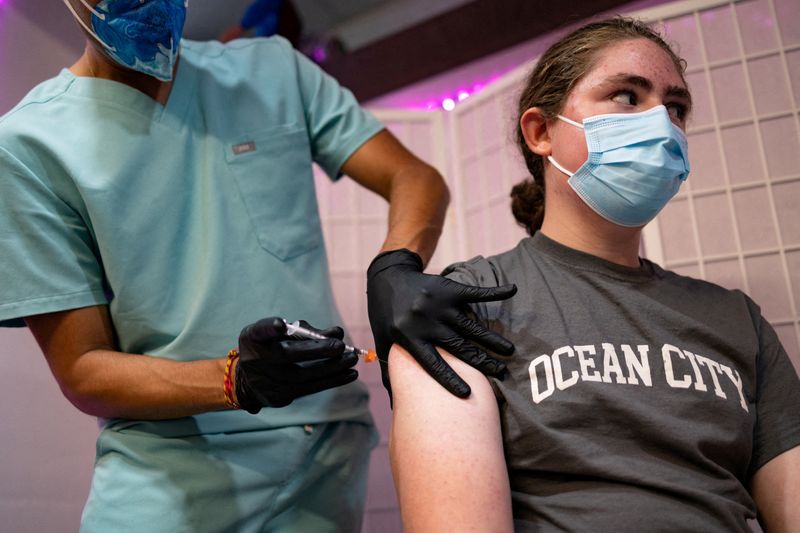By Julie Steenhuysen and Raghav Mahobe
(Reuters) -The updated COVID-19 boosters from Pfizer (NYSE:PFE) Inc/BioNTech SE and Moderna (NASDAQ:MRNA) helped prevent symptomatic infections against the new XBB-related subvariants, offering new evidence of how the vaccines perform against these fast-spreading strains, U.S. officials said on Wednesday.
"Today we have additional evidence to show that these updated vaccines are protecting people against the latest COVID-19 variants," Dr. Brendan Jackson, head of the U.S. Centers for Disease Control and Prevention's COVID-19 response, told reporters in a briefing.
Released last fall, the updated boosters target the BA.4 and BA.5 Omicron variants of the SARS-CoV-2 virus, which are no longer dominant. The now-dominant XBB-related subvariants are derived from the BA.2 version of Omicron.
Lab studies had suggested that vaccine protection was lower against the XBB variants compared with prior variants, raising questions about how well the vaccines worked against these rising strains of the virus, Jackson said.
For the study, researchers reviewed COVID-19 cases from Dec. 1 through Jan. 13, a period in which U.S. circulation of XBB and XBB.1.5 increased. It showed that the updated vaccine helped prevent illness in roughly half of the people who had previously received two to four doses of the original COVID-19 vaccine, CDC said.
The CDC said the updated vaccine worked similarly against BA.5-related infections and XBB/XBB.1.5-related infections. It was 52% effective at preventing infections against BA.5 and 48% against XBB/XBB.1.5 among those aged 18-49. Effectiveness fell to 37% against BA.5 and 43% against XBB/XBB.1.5 among those aged 65 years and older.
Although not reflected in the study, Jackson said data to be released later on Wednesday shows the updated vaccine reduced the risk of death from COVID-19 by more than twofold compared with vaccinated people who had not received the updated booster. The updated shot also reduced the risk of death from COVID-19 by nearly 13-fold in people who are unvaccinated.
Study author Ruth Link-Gelles of the CDC said overall, the vaccines cut the risk of symptomatic infection by about half on a population, but individuals see a different benefit based on their risk factors.
Link-Gelles said the estimates are for symptomatic infection, which CDC defined as one or more symptom of COVID-19. Given the findings, the CDC urged people to stay up to date on their recommended COVID-19 vaccines.

XBB.1.5 was estimated to make up nearly half of U.S. cases in the week ended Jan. 21, government data showed.
The CDC analysis comes ahead of a meeting on Thursday at which outside experts to the U.S. Food and Drug Administration are expected to discuss whether and how the United States should offer the COVID vaccine as an annual shot.